Crazy About Bio: Organic Food in France and the USA
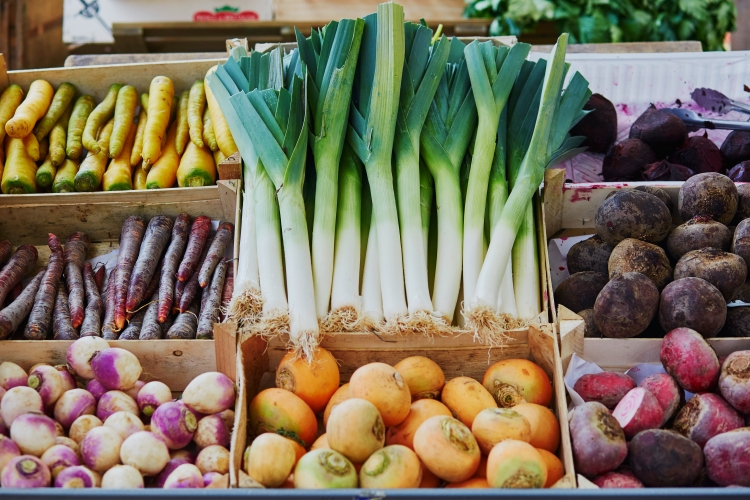
After arriving in Paris a month ago, I quickly scoped out the organic hubs and go-to bio places in my neighborhood — both as a wishful (all-be-it, broke) consumer and as a budding organic nut. I have found stalls advertising organic produce, cheese and meat at my local covered market in Batignolles, green sections and options at the Franprix around the corner. There is a "direct producteurs" shop down the street called Au Bout Du Champs that has organic produce delivered daily from local farms surrounding Paris.
But who can afford to go 100 percent organic and “green”? As a recently remitted university student, I really can't, but I aspire for three things when I shop: organic, biodegradable, and/or recyclable. After moving here from New York City, I had no idea if keeping up with these principles would be a challenge. I was pleasantly surprised to discover that Parisians are on par, if not ahead, of New Yorkers regarding the “bio-craze”.
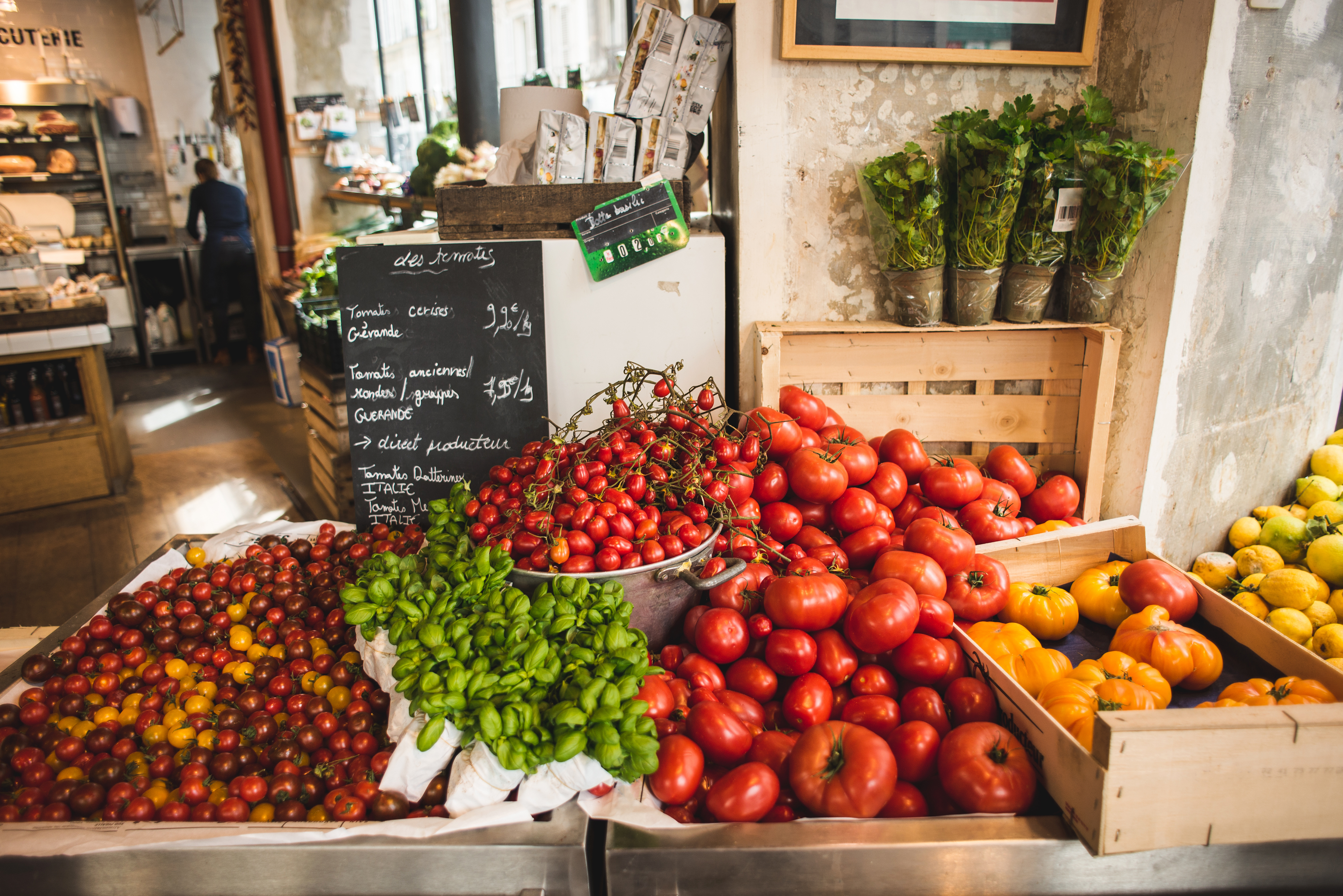 Image Credit: Shutterstock/Gorodisskij
Image Credit: Shutterstock/Gorodisskij
Here, I mostly buy raw ingredients, mainly produce, sold loose rather than prepackaged. I can't help but get a nice cheese once a week and a loaf or two of bread (this is France after all), and I buy fresh eggs, yogurt, perhaps a box of cookies or something chocolate! I almost never buy meat anymore, mostly because of the cost, but also for environmental reasons. I like to have a glass of wine or beer when I get home from school to unwind, so I usually pick up something in the €3 range from Franprix. I've ventured into Bio c' Bon once to get a bag of trail-mix and candied ginger (which cost €9!!!), but I prefer my local markets to the chains. I'd say at least half of the food I buy is certifiably organic, and I will discuss what that means shortly.
Image Credit: Shutterstock/FoxyForestManufacturerersIt has certainly become trendy these days to be, and to buy, green. It is springtime year-round in stores as the shelves turn green, row after row. Entire stores have sprung up and enjoyed massive success based on the premise of supplying sustainably sourced organic and "natural" products — Whole Foods, Trader Joes, and Sprouts in the U.S. and stores such as Bio c' Bon and BioCoop here in Paris. Companies know that people want to buy organic and enough are willing to pay extra for it, so there's plenty of incentive for the market to grow.
According to the International Federation for Organic Agricultural Movements (IFOAM), France is the third-largest market for organic products. Just as in the states, the trend towards organic foods is shifting in France. The growth of the organic market in France has been steady in the past decade and exponential in just the past year alone.
Organic food products in France recorded historic growth in 2016, according to new information announced by Agence Bio, the French agency for the development and promotion of organic farming. The agency estimates that the organic market saw an increase of approximately 20 percent in the first semester of 2016 compared with the same period in 2015. At the end of the year, the organic market should reach nearly €7 billion ($7.6 billion) – an increase of more than €1 billion ($1 billion) in only one year.
For once, as far as I'm concerned, it seems the market is reflecting the best of consumer intentions and choices – but exactly what is the rationale behind the “bio-craze” in France?
Euromontior international adeptly sums up the organic-buying demographic in France: "Organic products typically appeal most to consumers with higher incomes. Couples without children or couples with children who are no longer living at home are the household types that are most interested in organic products. These consumers are generally more concerned with health and wellness, and have the disposable income to address these concerns”
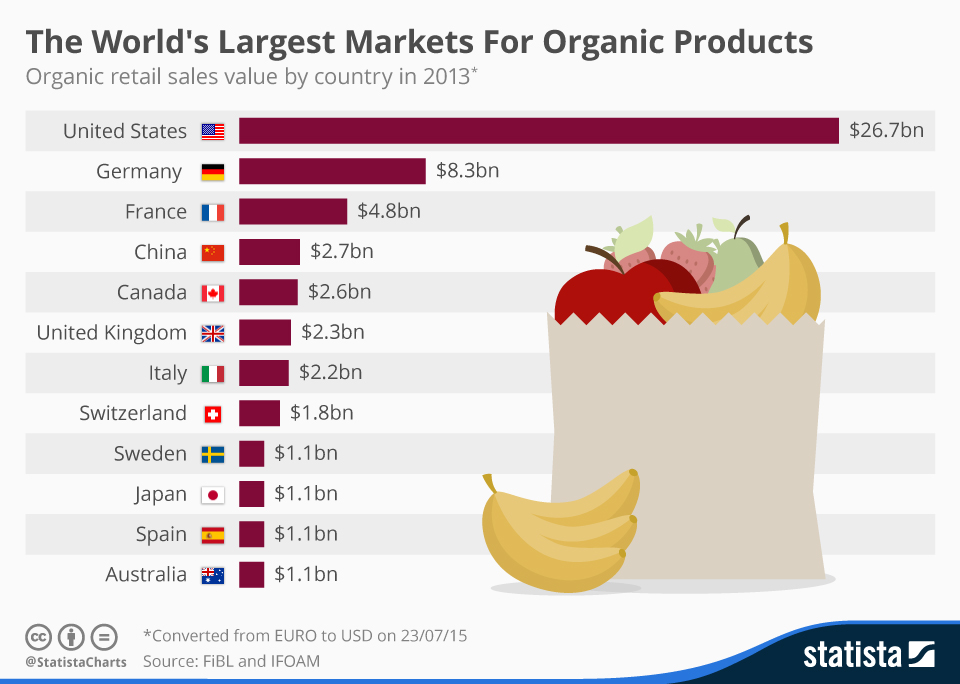 Image Credit: Statista/FiBL and IFOAM
Image Credit: Statista/FiBL and IFOAM
I have a problem with this rationale — switching to organic food out of concern for health and wellness. Here’s the thing, there is no certified, tried-and-true scientific evidence linking consumption of organic products and increased health. That isn’t to say that organic isn’t better for you, or that it’s bad for you. Not even close. It is just that the scientific jury is still out as far as the actual health benefits from eating an organic diet.
The health benefits of eating organic foods is still being debated. In the early 2000s, it was believed that organic food was better for you, as seen in articles published by such reputable sources as the New York Times. Nowadays, skepticism is more the trend as seen in this 2016 Telegraph article: “Scientific studies do not show that organic products are more nutritious and safer than conventional foods.”
We’re possibly decades away from knowing the truth about health benefits since no one study or even ten studies can be relied on as fact. The scientific process takes much longer than that, I'm afraid. So, maybe you just put your faith (and your health) in the hands of organic farmers.
But you could do worse. While the health benefits may not be clear, what is fairly certain is that with organic foods you are consuming fewer synthetic pesticides, not to mention sludge water residue. The animals that you consume get to at least see the light of day before being butchered. You’re avoiding and decreasing the risk of antibiotic resistant bacteria and choosing to support a slew of other environmentally conscious and sustainable farming practices that will one day cut into the whole lot of bad that industrial food production is causing. That, for me, is justification enough.
I buy organic for the environment, and that is why you, Paris, France, New York, America, and the world should buy organic too. The infrastructure obviously isn't there yet for global organic foods consumption, but as consumers our purchases can make a difference towards further organic farming and development.
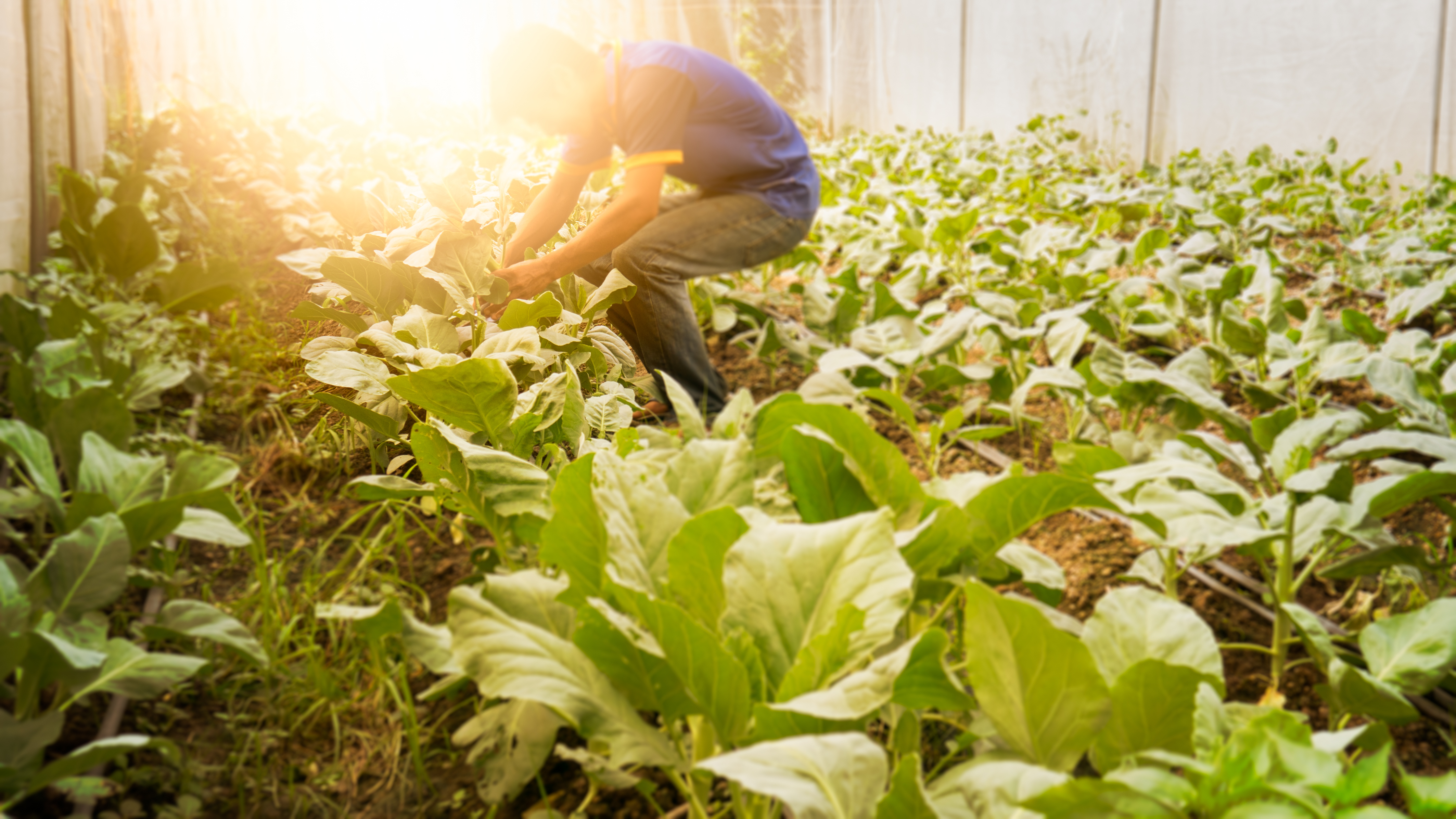 Image Credit: Shutterstock/PanyaAnakotmankong
Image Credit: Shutterstock/PanyaAnakotmankong
But as noted, the food production industry is wise to this trend and, while some companies and manufacturers are genuinely making the shift towards more organic and environmentally conscious food production, know that they can splash some green on a box or throw in a “natural” or “local” descriptor and still fool the best of us. But why do we do you buy into it? Why are we so captivated by the color green or the word bio that we believe it means the product we are buying is better? The market is taking advantage of the ambiguity in packaging, selling everything literally in green because people don't always realize what they are buying but really like to feel like they are doing something good.
An article in The Atlantic highlighted this point, in particular about American Millennials, the category I fall into. Generally speaking, we don’t really know what organic means, we don’t have a real concept of what the process of certifying organic actually entails, but “[we] desire honesty. [We] want to believe." We like the idea of socially-responsible companies, and we want to be socially responsible consumers. But can we be that while also being ignorant about what we are actually buying and why? A lot of us are guilty of presumption here, it’s not just me, right?
I've raised the issues that many of us are not buying organic for the right reasons, that there is a minefield of false-advertising and corporate cleverness that we have to navigate, and that we are caught in a trend that makes us feel good but that we don't fully understand. But in the end, it's a good trend to be caught in and to be catching on. It is good that the organic foods market is growing and that people are crazy about it. We just have to keep it all in check, in perspective and consume wisely. So going forward, I aim to be more mindful, conscious and educated about the green boxes I throw into my shopping basket.
Without turning this article into a book, know that the organic certification processes for the United States Department of Agriculture (USDA), as well as the slew of organic and eco-conscious certifications in France and Europe are actually extremely rigorous and verifiable. Sure, there is some speculation that once certified, a lot of farms slack off in their practices, but it still has to be better than industrial pork factories and pesticide glazed fruits and vegetables, no?
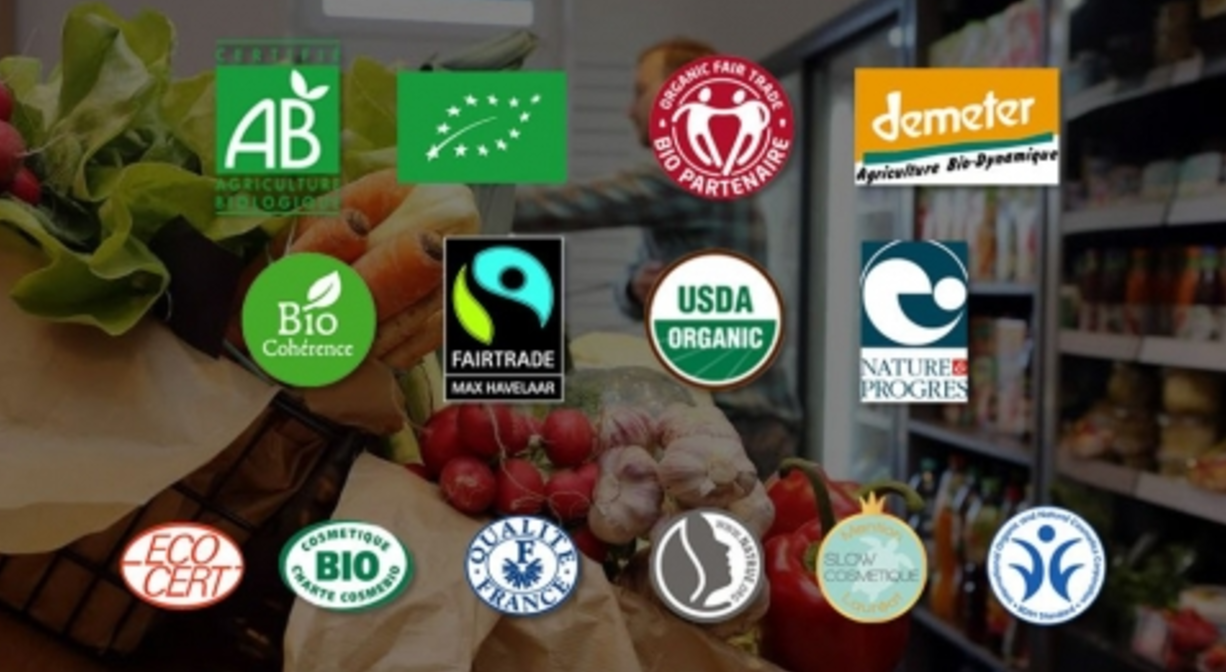 Image Credit: BioalaUne/ValentinePoingon
Image Credit: BioalaUne/ValentinePoingon
Here are the labels to look for when you are at the store, particularly stores that aren’t bio-dedicated, but even there as well. Beware! Just because it says "bio" or "organic" on the label doesn't mean it actually is unless it has been certified. Generally speaking, you can trust anything that has the green Agriculture
Biologique (AB) logo, the Bio Europe (with the green leaf) logo, or the Bio Cohérence labels (which certifies, in particular, organic foods from French Farms). Check out this guide to see what those labels actually mean and what other labels to keep an eye out for.








